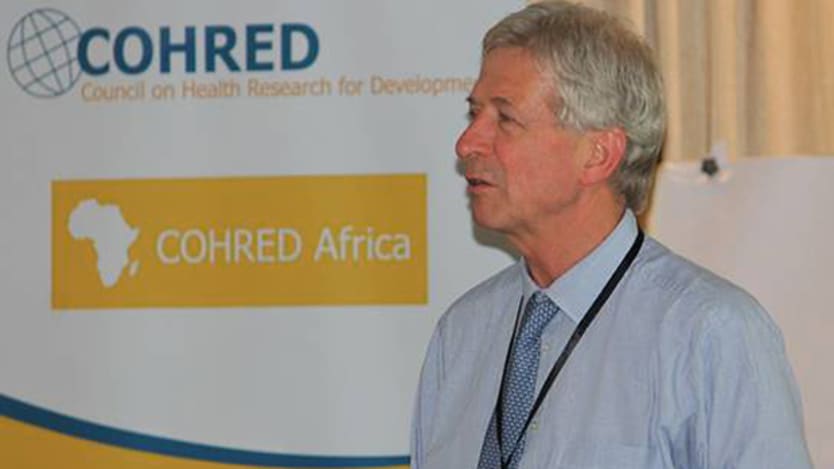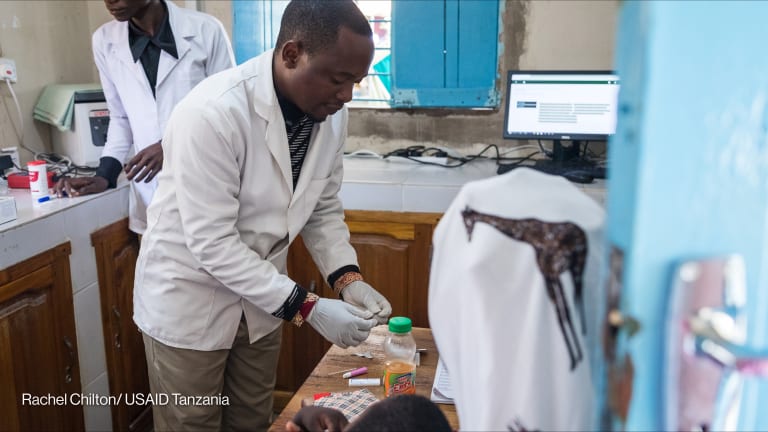
The Global Forum on Research and Innovation for Health 2015 isn’t bound to be your typical international gathering on global health.
To be held in Manila, Philippines, the forum won’t be exclusive to health experts and policymakers. Rather, it will welcome all key players in health research and innovation, including young innovators, civil society groups, financing institutions and the private sector, and is designed to be a solutions-driven convention.
“The idea is ultimately there's meaningful change at the end,” Dr. Carel IJsselmuiden, executive director of the Council on Health Research for Development, told Devex, noting that often research meetings end with papers, “but ultimately you want to be solving a particular problem.”
COHRED, the nonprofit whose aim is to strengthen research for health and innovation systems, is co-organizing the forum with the Philippines’ Department of Health and Department of Science and Technology. The event is a follow-up to the Global Forum for Health Research, which took place in 2012 at another city in the “global south,” Cape Town, South Africa.
A platform for young people
Apart from being the first of its kind, by focusing on both health research and innovation, the global forum has an eclectic vibe.
There will be a hackathon, where programmers develop apps using health data that can support the implementation of programs in their countries; a debate tackling issues relevant to the forum; a film festival, which will showcase short films about health to be shown before, during and after the forum; a photo exhibit; an essay competition; and a preconference workshop on grant writing — all meant to bring in strong involvement of the youth.
“We consider the youth the emerging sector, the future of where health research will go so we must engage them,” said Dr. Jaime Montoya, executive director of Philippine Council for Health Research and Development under the Department of Science and Technology.
The forum promises to provide an opportunity for young researchers to showcase their work to a wider audience. For instance, winners of the essay competition will see their work published in one of the journals of the Asia Pacific Association of Medical Journal Editors. It’s often rare that researchers below the age of 35 get published, noted IJsselmuiden.
Additionally, those whose abstracts are accepted for presentation will also receive support from sponsors so they can travel to attend the gathering.
‘Speed dating’ for funders and innovators
Ultimately, the organizers want the forum to be a place where important connections happen and that subsequently lead to scalable solutions to pressing health challenges.
Organizers are working on bringing as many funders, especially venture capitalists, as possible to participate in a “speed dating” session where innovators have a chance to pitch their ideas for two minutes.
“You do it well, you get the prize,” said IJsselmuiden.
The ideas may then be subjected to a public vote. The number of winning entries, though, will depend on “whether we can get enough donors, industry or venture capital investors to actually commit their chequebook.”
An emphasis on social impact
Organizers said they have also made sure to engage civil society organizations, and in fact a few have indicated they want to run sessions.
Part of the program will tackle the issue of social accountability in research and innovation for health, where civil society groups are expected to have a key role. One session, in particular, is looking to develop and measure indicators for socially accountable components of and as well as validate the impact and outcomes of social accountability-framed interventions in health and development programs.
The forum is also designed to be a place for businesses to demonstrate how they can actually make an impact in global health, according to the organizers. It won’t be a typical trade fair, where companies present their products and services, since the audience won’t be buyers. It is more about shedding light on innovative programs that can be leveraged in developing countries, or the contribution experts can make to patent sharing, the organizers said.
“Many industries, even the new industries, in Asia are moving away from the financial bottom line as their only kind of target and increasingly use the social and environmental bottom line,” IJsselmuiden told Devex. “What we are after is to create a platform that enables industry to both explore and demonstrate how they improve their own social bottom line.”
Pursuit of value for money
Organizers see policymakers benefiting greatly from the forum, since it will allow them to not only get up-to-date with the latest best practices in health to improve health service delivery, but also connect with those who could be commissioned to implement research needed in specific areas, such as health systems strengthening.
Thus research “will be more relatively quick than the usual so that the impact will be seen very quickly in the field,” said Vicente Belisario Jr., undersecretary at the Philippine Department of Health.
Montoya added: “We really have to have a meeting ground wherein the policymakers tell us what they need and what they want. And the researchers will say ‘we can do this’ and ‘we do that.’ That's what we call relevant policy-oriented research.”
The Global Forum on Research and Innovation for Health 2015 is slated for Aug. 24-27, 2015, at the Philippine International Convention Center. To learn more about the forum and how you can participate, visit http://www.forum2015.org.
You can help shape our coverage on global development innovations. What do you think is an innovative idea? Let us know by leaving a comment below or by emailing news@devex.com.








